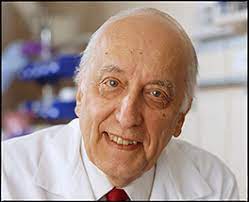
Thomas Alexander Waldmann, MD
Recipients of the Thomas A. Waldmann Memorial Award for Excellence in Human Immunology
The Thomas A. Waldmann Memorial Award for Excellence in Human Immunology will be awarded to an immunologist/cell biologist who has made major contributions directly or indirectly to the understanding of primary immunodeficiency diseases.
- 2023John O’Shea
- 2022Gerald Orth
- 2019Jean Laurent Casanova
- 2018Michael Leonard
- 2017Yanik Crow
- 2016Luigi Notarangelo
- 2015Daniel Kastner
- 2014 Rochelle Hirschhor
- 2013 Rebecca Buckley
- 2012 Mary Ellen Conley
- 2011Max D. Cooper
21st September, 1930-27th September, 2021
Thomas A Waldmann, Chief Emeritus of the Lymphoid Malignancies Branch, NIH Distinguished Investigator and immunology pioneer passed away on the 27th September, 2021, a week after his 91st birthday.
Thomas Waldmann made major contributions to the science of Immunology, especially in primary immunodeficiency, cancer, and autoimmunity.
Thomas A. Waldmann was born in New York City on September 21, 1930. Dr. Waldmann received his M.D. from Harvard Medical School, and residency in internal medicine at Massachusetts General Hospital. In 1956, Waldmann join NIH as a Clinical Associate in the NCI’s Metabolism Branch, becase Senior Investigator in 1959, and in 1973 became Chief of Metabolic Branch (now Lymphoid Malignancy Branch) of National Cancer Institute.
In 1961, Tom Waldmann discovered Primary intestinal lymphangiectasia as a cause of hypogammaglobulinemia. Later, the National Organization of Rare Diseases named the disease “Waldmann Disease. In 2016, Michael Lenardo, discovered the genetic basis of Waldmann disease and attributed to defects in the CD55 gene encoding for the decay accelerating factor.
Waldmann defined hypercatabolism of IgG in patients with myotonic dystrophy and of IgG and albumin in patients with familial hypercatabolic hypoproteinemia, a disorder wherein Waldmann and Anderson defined a mutation in the signal peptide of beta-2 microglobulin, an element of FcRn involved in the concentration-catabolism effect of immunoglobulins and albumin.
In 1981-82, with his coworkers, Stanley Korsmeyer and Philip Leder, Tom Waldmann introduced the analysis of immunoglobulin gene rearrangements and established a hierarchical order of immunoglobulin gene rearrangements in humans wherein heavy-chain rearrangements precede those of light chains and kappa-gene rearrangement precede lambda gene rearrangements.
In 1981,his post-doctoral fellow late Takashi Uchiyama, serendipitously made antibodies against IL-2 R. Using this antibody (anti-Tac), Tom Waldmann defined the IL-2 receptor subunits IL-2R beta (CD122) and IL-2R alpha (CD25). He introduced different forms of IL-2R-directed therapy, including unmodified murine antibodies to IL-2R alpha (anti-Tac), humanized anti-Tac (daclizumab, Zenapax) and the antibody armed with toxins or alpha and beta-emitting radionuclides. In 1997, the FDA approved the IL-2 receptor antibody as a treatment to prevent transplant rejection. Later IL-2 receptor antibodies were approved as therapies for immune-related disorders, cancer, and multiple sclerosis.
While studying IL-2 and its receptor, Waldmann co-discovered IL-15, and elucidated its role in the development and persistence of NK and CD8 memory phenotype T-cells, and inhibition of activation-induced cell death. These properties of IL-15 provided the scientific basis for its therapeutic use in cancer. Tom was investigating downstream mediators of the IL-2 and lL-15 pathways, and the effectiveness of JAK-STAT inhibitors as cancer treatments.
He was also an outstanding mentor, many of his post-doc fellows were elected to the National Academy of Sciences USA, and one received Noble Prize. He published more than 880 scientific papers and delivered over 100 named honorary lectures or keynote addresses
Tom Waldmann received many honors recognizing his scientific contributions that included, the Ciba-Geigy Drew Award in Biomedical Research, the Artois-Baillet Latour Health Prize, the Bristol-Myers Squibb Award in Cancer Research, the Paul Ehrlich Medal, the AAI-Dana Foundation Award, as well as election to the National Academy of Sciences, American Academy of Arts and Sciences, the Institute of Medicine of the NAS, Hungarian Academy of Sciences, and as a Fellow of the Royal Society of the Medical Sciences (UK).
In 2001, to recognize his major contributions to human immunology, the Foundation of Primary Immunodeficiency (FPID) endowed an annual Thomas A Waldmann Memorial Award for Excellence in Human Immunology given to an outstanding scientist who has made major contributions in the field of primary immunodeficiency diseases. At the annual FPID gala fundraiser event, Tom used to present the award to the recipients. The recipients included Max Cooper, Rebecca Buckley, Daniel Kastner, Luigi Notarangelo, Michael Lenardo, Jean-Laurent Casanova, Steven Holland.
Photography was Tom’s hobby. He was interested in nature and experimental photography. He joined the Camera club of NIH, and he was the color-slide photographer of the year in 19 or 20 camera club competitions.
The last note I received from him 2 months prior to his death:
Dear Sudhir I will not be able to attend the meeting this year I have been limiting my attendance and presentations to virtual meetings. …..Although I am 90 I still work full time. From home for the NIH I have 90 papers in the last two cycles that is since 2013. My last site visit was the best ever. My next is in December just after your meeting Good luck to you and the winner of the Thomas Waldmann MD award Best, Tom
In 1958, Tom married late Dr. Katharine Waldmann. They met when Tom wasan intern at MGH, and Kathy Spreng was on house staff. According to Tom, “she was my boss” . Katherine passed away on the 15th August, 2020, and they have three Children: Richard, Robert, and Carol Waldmann.
Tom and I knew each other since 1974. His death is a personal loss to me. I will miss his annual presence and discussion at annual conference of primary immunodeficiency diseases and annual gala fundraiser for FPID at which he used to present Thomas A Waldmann Memorial Award in Human Immunology to the recipients.
The scientific community has lost a giant in the field of translational research in Immunology; however, we will cherish his achievements and contributions to primary immunodeficiency, cancer therapeutics, and autoimmune disease for generations to come.
Sudhir Gupta
